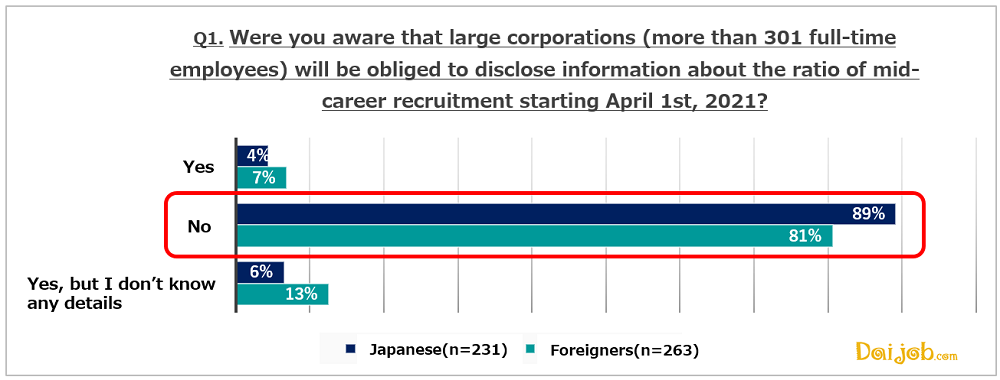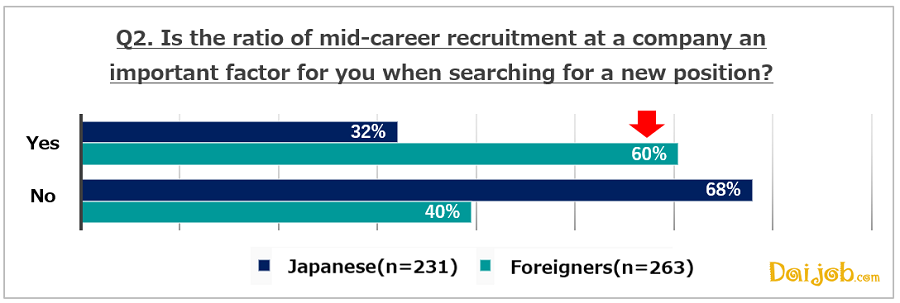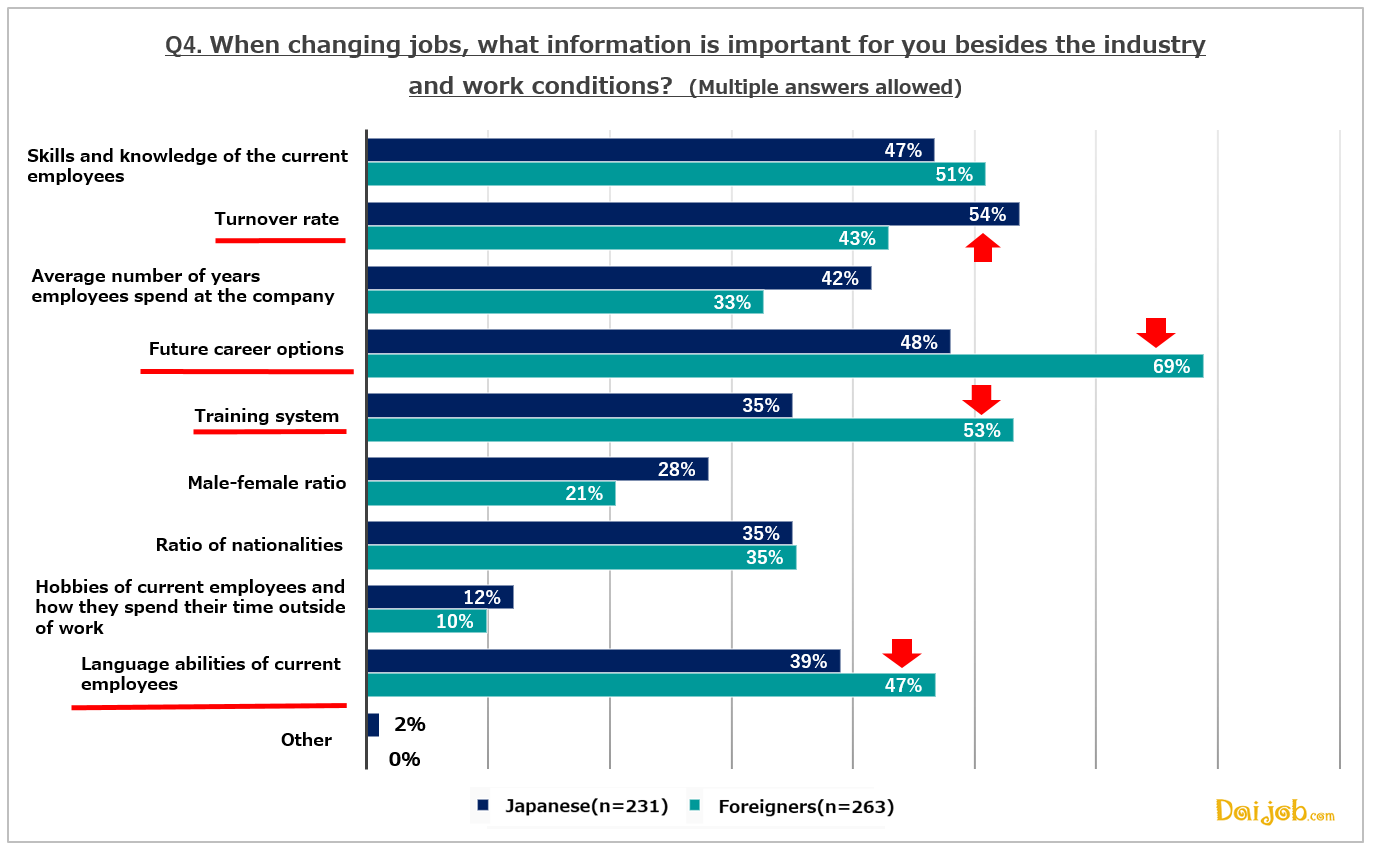News & Report
REPORT2021/3/19
"Turnover rate" and "Career paths" are what global talents really want to know when changing jobs
~Original Survey on the Requirement to Announce the Ratio of Mid-Career Hires, Starting in April 2021~
Human Global Talent Co., Ltd. (Shinjuku-ku, Tokyo; Representative Director: Tomoki Yokokawa; hereinafter "we"), which operates the "Daijob.com" online job board and recruitment website for bilinguals, conducted an original survey of it’s registered users.
【Survey Results - Key Points】
■Not many Daijob.com users are aware that starting April 2021, it is be mandatory for large companies to disclose information about their ratio of mid-career recruitment
■Approximately twice as many non-Japanese candidates consider the ratio of mid-career recruitment important when changing jobs, as compared to Japanese candidates
■When changing jobs, Japanese candidates tend to look at various attributes of the company, whereas non-Japanese candidates tend to focus on possible future career paths
【Introduction】
Starting April 2021, it has become mandatory for large companies to disclose their ratio of mid-career recruitment (*1). The reason for making the disclosure of this information mandatory was the need for diversification of career development and work styles due to the declining birthrate and aging population in Japan. The purpose of this survey was to examine how does this new regulation impact global talents seeking career advancement and compare the results for Japanese and non-Japanese Daijob.com users.
※1.According to the Act on Comprehensive Promotion of Labor Policy, which was amended with the aim of reforming the employment system, and is enforced by the Ministry of Health, Labor and Welfare, it will be mandatory to publicize the ratio of mid career recruitment: number of hired mid-career employees divided by the number of all hired full-time employees.
【Details of the survey】
-------------------------------------------------------------------------------------------------------------------------------------
【Period】Friday, February 19th to Wednesday, February 24th, 2021
【Target】Daijob.com users
【Number of respondents】Japanese: 231, Non-Japanese: 263
※Please note that the aggregate results might not necessarily correspond to this number as some respondents might not have answered all questions.
【Content】What is important to Japanese and non-Japanese candidates when changing jobs (Survey regarding the ratio of mid-career recruitment at companies)
--------------------------------------------------------------------------------------------------------------------------------------
■Survey Results
1.The new regulation is nearly unknown to both Japanese and non-Japanese candidates

Less than 10% of both Japanese and non-Japanese respondents were aware of the new requirement for companies to disclose their ratio of mid-career recruitment. This regulation has come into effect starting April 2021, but the awareness is still generally very low.
2.The ratio of mid-career recruitment at companies is more important to non-Japanese job seekers than to Japanese job seekers

Twice as many non-Japanese job seekers responded that the mid-career recruitment ratio is important to them when searching for jobs, with only 32% of Japanese job seekers seeing it as an important factor. Japan has a steadily built system of "mass recruitment of new graduates", which might be the reason for foreigners who wish to work in Japan to think about whether the companies are interested in hiring mid-career talents and whether they have a support system for them after they join the company.
3.Approximately 70% of both Japanese and non-Japanese mid-career candiates see this information as a way to learn about the corporate culture


Looking at the reasons why job-seekers see this information as important, the most common answer for both Japanese and non-Japanese was that "It is a hint to understanding the company’s culture." About twice as many Japanese found the reason to be "To find out if I can fit in at the workplace", as compared to non-Japanese.
As for those who answered that the mid-career recruitment ratio is not an important factor, 30% more of non-Japanese respondents stated that "It has no impact on their work" and that "It is common for companies to have a certain number of mid-career recruits," creating a gap between the Japanese and non-Japanese candidates.
From these results, we can assume that the Japanese respondents tend to adapt to a “Membership-type employment” (*2) which is standard in Japan, and many non-Japanese are more used to the “Job-type employment” (*3), which is more common overseas.
※2.Membership-type employment:A system where the employees are hired based on how well they “match” the company and not their job specialization or the work location.
※3.Job-type employment:A system where the employees are hired based on their experience and skills.
4.Besides the basic company information, most Japanese job-seeker are interested in the "turnover rate", while almost 70% non-Japanese are interested in possible "career paths"

When changing jobs, besides the basic information about the company, Japanese candidates put a lot of importance on the "turnover rate", while non-Japanese candidates focus on the "future career options". In Japan, it is often perceived negatively if a candidate has changed jobs more than four times, which might be the reason why many Japanese respondents are curious about the turnover rate at companies, giving them a hint on how long the employees usually stay. On the other hand let us look at an example from the US (*4), where there is a strong idea that one should build up their own career. Here, the data for the baby boom generation (born between 1957-1964) shows that people will have worked in on average 12 companies between the ages of 18-50 (according to a survey by the Labor Statistics Bureau of the U.S. Department of Labor). These differences between Japan and overseas in the perception of the number of job changes can be seen reflected in the results of this survey.
In addition, non-Japanese candidates are interested in the company’s "training system" and "language skills of current employees”. Many global talents registered at Daijob.com are already residing in Japan, and would like to know more about the specific conditions at Japanese workplaces.
※4.from "Daijob HRClub" Overseas Employment and Career Change Information "Looking at Employment and Career Changes in the US."
(https://hrclub.daijob.com/column/4513/)※Japanese only
Tomoki Yokokawa, Representative Director of Human Global Talent Co., Ltd.
Due to the requirement to publish the ratio of mid-career recruitment, we expect to see a change in not only work styles but also career development, which will become more diverse. The candidates are increasingly more interested in various information when changing jobs, such as employee turnover rates, career paths, and workplace training systems. We can expect that a higher level of engagement will be required from both the employees and companies.




